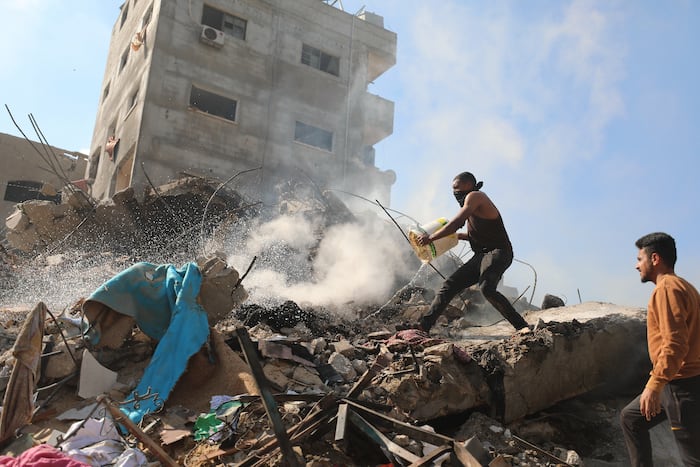Israel did not immediately respond to Safadi’s comments, which included a call for an immediate ceasefire and an end to the fighting.
Jordan’s foreign minister on Saturday issued blistering criticism of Israel’s war against Hamas in the Gaza Strip, describing it as “blatant aggression” against Palestinian civilians that threatens to engulf the entire Middle East. Ayman Safadi’s harsh assessment, in which he claims that Israel has committed “war crimes” by laying siege to the Gaza Strip and cutting off supplies of food, medicine and fuel, shows how tense relations have become between Israel and Jordan – which in a peace agreement was reached in 1994.
“We must all speak loud and clear about the catastrophe that the Israeli war brings, not just for Gaza, but for the region in general,” Safadi told the International Institute for Strategic Studies’ Manama Dialogue summit in Bahrain . “This is not the time to mince words. This is a time to call the facts as they are.”
He added: “This is not self-defence. This is a blatant aggression whose victims are innocent Palestinians.”
Israel did not immediately respond to Safadi’s comments, which included a call for an immediate ceasefire and an end to the fighting. In attendance, however, was Brett McGurk, the White House National Security Council’s Middle East coordinator, who said that “a release of a large number of hostages would result in a significant lull in the fighting … and a huge wave of humanitarian aid .”
“There is no going back to October 6. That applies to Israel. That goes for the Palestinians too,” McGurk said. “No country can live with the threats of terror we saw Hamas unleash at their border on October 7. And at the same time, Palestinians deserve security and self-determination.”
The European Union’s top diplomat, Josep Borrell, added: “It is completely understandable that without the freedom of the hostages nothing can be solved.”
Safadi later responded sharply: “Israel is holding 2.3 million Palestinians hostage.”
The war began with Hamas’ unprecedented attack on October 7 in southern Israel. Hamas militants killed about 1,200 people, mostly civilians, and kidnapped about 240 men, women and children, returning them to the Gaza Strip.
Israel responded with a bombastic campaign of airstrikes and then a ground offensive that encircled Gaza City north of the Gaza Strip. According to Palestinian health authorities, more than 11,400 Palestinians have been killed in the war, two-thirds of them women and minors. Another 2,700 have been reported missing, believed to be buried under the rubble. The count does not distinguish between civilians and militants, and Israel says it has killed thousands of militants.
The annual Manama dialogue in Bahrain typically focuses on Gulf Arab countries’ fears about Iran in the region, something Borrell even joked about during his remarks. This year, however, the war between Israel and Hamas took center stage, in part when Bahrain and the United Arab Emirates reached diplomatic recognition agreements with Israel in 2020.
On Friday evening, Bahrain’s Crown Prince Salman bin Hamad Al Khalifa opened the summit by calling for an exchange between Hamas and Israel over the hostages and a stop to the bloodshed.
‘You would call it a ceasefire. You might call it a break. You can call it whatever you want,” said the prince. “The intention is a pause so that people can take stock. People can bury their dead. People can finally start to grieve. And perhaps people can start to wonder what intelligence failure led to this crisis in the first place.”
Speaking before Saturday’s summit, Safadi described the Israeli government now led by Prime Minister Benjamin Netanyahu as the most right-wing coalition to ever rule the country and apparently bent on driving Palestinians out of the Gaza Strip. He said this “will pose a direct threat to our national security” in Jordan and Egypt.
“They have all been saying for years that the only way forward is to kick the Palestinians out of their ancestral land and wipe the Palestinians off the face of the earth,” Safadi said.
After the war, Safadi said that Arab countries would also not “come to clean up the mess after Israel.”
“Let me be very clear. I know I speak for Jordan, but after discussing this issue with many, with almost all our brothers, no Arab troops will go to Gaza. No. We will not be seen as the enemy,” he said. “How can anyone talk about the future of Gaza if we don’t know what kind of Gaza will be left once this aggression ends?”
Safadi emphasized that the only way forward would be a two-state solution for Israelis and Palestinians, even though the peace process has been moribund for years.
McGurk also offered what he described as “five no’s” for the war: “No forced displacement, no reoccupation, no reduction of territory, no threats to Israel, no siege.”
Meanwhile, Israel’s attempts to conclude new diplomatic recognition agreements with Arab countries – especially Saudi Arabia – appear to be frozen.
“We have said that the fallacy of assuming that you can parachute over the Palestinian issue to create regional peace is wrong,” he said. “It will only bring disaster. And here we are. Show me who is talking about any regional project in this war, who is talking about integration right now? It’s all about war.”
However, McGurk emphasized that the Palestinians have a crucial place in any possible diplomatic agreement between Israel and Saudi Arabia.
“In this case, what was true before Oct. 7 is even truer now,” he said. “That central problem must be addressed. And now that Hamas has been relegated, we are determined to help tackle this.”


